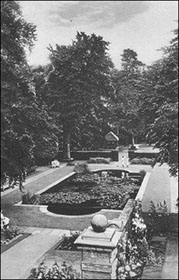Origins
Founded in 1896, the Bournville Musical Theatre Company first began as the “Bournville Musical Society (Light Opera Section)”, and operated for the benefit and enjoyment of Cadbury workers at their factory in Bournville.
At this time there were 5 sections: the Choral Society, the Orchestral Section, the Silver Band, the Banjo & Mandolin Section and the Organists Section. The latter 4 sections of the Musical Society were disbanded due to a fall in membership over the next 10-15 years, although two new sections, the Grand Opera and the Male Voice Choir were later formed.
In 1921 it was suggested that members of the Choral Section, instead of just singing choral numbers, should instead perform Gilbert and Sullivans’ “The Pirates of Penzance” for the Firm’s New Year Party on 6th February 1922, which was being held at the Edgbaston Assembly Rooms.
The show was so successful that the production was put on again in April to mark the opening of Cadbury’s new Dining Room which was equipped with a permanent stage. In all, six performances of “Pirates” were given, and because the show was so well received the Operatic Section was formed.
The Early Years

In March 1923 the society performed “Iolanthe”, followed by a performance of “The Mikado” in November of the same year.
In June 1924 a brave attempt was made to depart from the tradition of indoor performances by putting on an open air production of “Princess Ida” in The Girls’ Grounds, which are on the opposite side of Bournville Lane to the factory. Unfortunately, only two performances were possible as the rest were cancelled due to heavy rain, and the Society lost £250.00. In spite of this, Cadbury’s were very understanding and generously reimbursed them to the tune of £100.
After the performances of “The Gondoliers” in March 1925, Mrs. George Cadbury wrote to the Company asking if “encores could be omitted from future productions as they are putting a big strain on the artistes”!
In July 1925, it was suggested that the Musical Society should appoint an expert outside Musical Director to oversee the work of all the various Musical Society sections. To this end, Sir Adrian Boult, CH (then the principal conductor for the Birmingham Symphony Orchestra) was invited to take on this role at a fee of 100 guineas per year, a post he held until July 1928.
Membership of the Operatic Section was limited to 70 persons, and in November 1925 a rule was made that no member was allowed to audition for a principal role unless they had been in a prior production as a chorus member.
In 1927, Cadburys opened their new 750 seat Concert Hall. From then, all Society productions were performed at this magnificent Hall, until it sadly closed in 2000 due to alterations at the Works.
The Secretary of the Musical Society from 1925 – 1946 was Alderman A.F. Bradbeer, who became Lord Mayor of Birmingham from 1946 – 1947.
Membership of the Society was limited to Cadbury employees only, but in December 1928 it was decided that the spouses and friends of employees could join, provided that their number did not exceed 25% of the total membership.
Permission was granted to spend £5.00 to hire a donkey for the production of “Veronique” in March 1938, and this donkey, together with a Pyrenean Mountain dog which was used in the 1969 production of “White Horse Inn”, are the only animals to have been used in Company productions.
In 1937/38, the BBC broadcast a number of events from the Concert Hall which, on a number of occasions were followed by performances from the Musical Society.
Performing in Wartime
In April 1939 it was agreed to perform “The Gondoliers”, for the 1940 show, but with the outbreak of war the production was abandoned.
On the 5th April 1941, “Trial by Jury” was performed twice (2.45pm and 6.15pm) and was followed by a film of “The Mikado”. Both performances attracted a total audience of 1500 people, and a paragraph in the programme stated. ”An announcement will be made if an air raid alert is given. The performance will continue, but if you wish to leave please go quietly. Shelters are available in the basement!”.
The Company continued to put on shows during the War Years because it was felt essential that during this difficult time there was a widespread need for entertainment, but because so many Cadbury employees were in the Armed Services, members other than Cadbury workers were invited to participate in the shows.
Rehearsals were, in the main, conducted in Air Raid Shelters!
In March 1947, for their Silver Jubilee production, the Company put on “The Geisha”, and even though the Concert Hall was unheated and the winter weather being one of the worst on record with blizzards, frost and deep snow, the audience were not deterred from attending. Records do show however that the Company recorded a loss of £48.00.
Opening Up
In the 1960’s, because of a continuing fall in numbers, membership of the Society was opened to everyone, the only stipulation being (up until the Concert Hall closed in 2000) that it was mandatory that the Chairman of the Society was a Cadbury employee either present or retired.
The Company presented its Gold Jubilee production of “The Merry Widow” in March 1971 and because of the huge amount of publicity and interest for the show, tickets for all performances were sold out well before the first night.
In 2000, the last show was produced at the Concert Hall (Cole Porter’s “Anything Goes”), and the Company, which by this time had changed its name to the Bournville Musical Theatre Company, went firstly to The Old Rep. Theatre in Birmingham where it put on 3 shows, then onto its present venue of the Crescent Theatre.
The Present
As of 2020, in the 98 years that the Company has been in existence there have been many Directors but only 8 Musical Directors. Three only stayed for one show each, but of the other five, the longest serving was Jack Myers (38 Years) followed by J. Randall Cooke (18 years), Harold V. Tatton (8 years) and Gordon Stamford (3 years).
The Company’s present Musical Director is Chris Corcoran, who has now been “wielding the baton” at Bournville since 1992, a total of 28 years to date.
Written & collated by John Clay, with thanks to John Smith for his assistance.

Jack Myers
Former Musical Director
Chris Corcoran
Current Musical Director